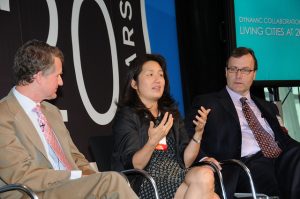 Louisville is one of five cities selected by national funder Living Cities and the Government Alliance on Race and Equity to join an effort, Racial Equity Here, to improve racial equity and advance successful outcomes for all in America’s cities.
Louisville is one of five cities selected by national funder Living Cities and the Government Alliance on Race and Equity to join an effort, Racial Equity Here, to improve racial equity and advance successful outcomes for all in America’s cities.
“Louisville is a compassionate city, dedicated to offering each and every individual the opportunity to reach their full human potential,” Mayor Greg Fischer said. “We have taken many steps to improve our city through innovation and regular analysis of our daily work and are focused on system-wide change.
“Racial Equity Here will help us develop even more tools to address disparities that seriously affect individuals across our community. We look forward to further advancing racial equity here in Louisville and taking a lead in closing the opportunity gap.”
Louisville will join Albuquerque, Austin, Grand Rapids, and Philadelphia as part of this effort.
Government leaders in each city will complete a racial equity assessment of their core government operations. This assessment will include an intentional focus on operations as they relate to adults and youth of color aged 16 to 24, who are disproportionally out of school or work.
By understanding how and where municipal operations affect young people of color, governments will not only better understand their role in perpetuating disparities but will also begin addressing them in transformative ways. Over a two-year period, the jurisdictions will develop a blueprint of government-wide strategies and begin executing the skills, tools and processes they develop through this work.
The cities participating in Racial Equity Here were selected based in part on a demonstrated commitment to improving racial equity and improving outcomes for young people of color, and to expanding efforts across the breadth of outcomes that government influences.
A cross-functional team of Louisville government leaders, led by the Office of Performance Improvement & Innovation (OPI2), submitted the application to participate in the initiative. The Center for Health Equity, Office for Safe and Healthy Neighborhoods, Office for Globalization, Departments of Community Services and Human Resources and the Human Relations Commission will all participate in the 24-month cohort, alongside OPI2.

Photo: Living Cities
Racial Equity Here builds on the work of the Government Alliance on Race and Equity (GARE), a joint project of the Center for Social Inclusion and the Haas Institute for a Fair and Inclusive Society, a national network of governments working to achieve racial equity and advance successful outcomes for all. GARE’s approach is based on the experience of early adopters of racial equity within government. The cities participating in Racial Equity Here will strengthen the evidence base around this work and blaze a trail for even more cities to follow suit.
“GARE is excited to partner with Louisville and Living Cities on this project,” GARE Director Julie Nelson said. “We expect the Racial Equity Here cohort to be a national leader in making transformational change toward racial equity within government and to achieve equitable outcomes for our youth. We look forward to working with this cohort and are excited to see what changes will happen.”
Living Cities CEO Ben Hecht said: “Cities participating in Racial Equity Here will be part of a leading national network of jurisdictions embracing racial equity in a systemic and structural way. This is one of the most important issues of our time, and these five cities have made an important commitment not only to their residents, but also to advancing racial equity across the country.”
Each city will receive an initial stipend from Living Cities of $25,000 to support the work, and an additional $50,000 to implement the Racial Equity Action Plan developed by that city, in addition to tools, resources, and training from GARE.These supports will enable the five cities to better understand and address the many issues tied to racial inequity—including segregation, exclusion, concentrated poverty, and blunted opportunities—that are within the power of government to change.
 Weather
Weather Traffic
Traffic @LouisvilleDispatch
@LouisvilleDispatch @LouisvilleDisp
@LouisvilleDisp Subscribe
Subscribe
Leave a Reply